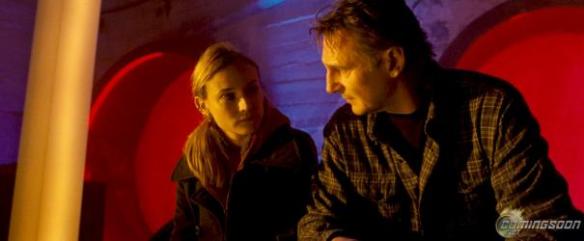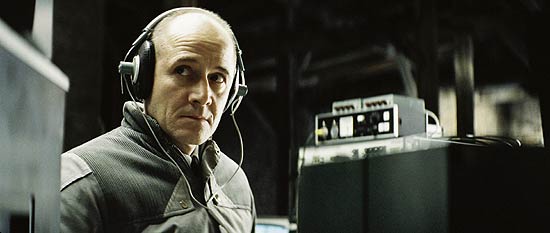(2011) Suspense (Warner Brothers) Liam Neeson, Diane Krueger, January Jones, Aidan Quinn, Bruno Ganz, Frank Langella, Sebastian Koch, Olivier Schneider, Stipe Erceg, Mido Hamada, Clint Dyer, Karl Markovics, Eva Lobau, Rainer Bock. Directed by Jaume Collet-Serra
Who are we really? Are we who we are because we say who we are? And what if we are told that is not who we are, that someone else is who we thought we were? Would the sales of Excedrin go through the roof if that were true?
Dr. Martin Harris (Neeson) is a mild-mannered botanist speaking at a biotechnology conference in Berlin, accompanied by his beautiful, icy blonde wife Liz (Jones). It is snowing and the weather is awful when they arrive. In the haste to get into a warm cab, Martin leaves his briefcase behind at the airport. This briefcase contains his passport and all his other important documents, so he turns around at the posh Hotel Adlon and boards another cab to get back to the airport to retrieve it.
Unfortunately, as they say, the best-laid plans of mice and men…a dreadful accident sends the taxi plunging off a bridge and into the icy waters of the river. Gina (Krueger), the plucky driver, rescues an unconscious Martin (who had hit his head against the window) from the sinking car and while the paramedics work on the stricken man, slips quietly away.
Four days later, Martin wakes up in the hospital with fractured memories of not only what happened to him but his entire wife. The sympathetic doctor (Markovics) tells him he has a head injury which can be tricky when it comes to memory, but the more Martin remembers the more frantic he gets regarding his wife, who has no idea what happened to him and must be going out of her mind by now. However, when he finally checks himself out of the hospital (against doctor’s orders) and heads back to the Adlon, Liz doesn’t remember him. Not only that, she is with another man (Quinn) whom she calls her husband and who seems to be…him.
This is awfully distressing to Martin. He is desperate to prove that he is him, but has no documentation, and very little cash. He visits a colleague, Dr. Bressler (Koch) who invited him to the conference only to find the other Dr. Harris there, who not only has proper documents but also family photographs. This so disturbs Martin that he faints.
The next thing he knows he is getting an MRI but when he comes out of it, an assassin (Schneider) has murdered his doctor and an even more sympathetic nurse (Lobau) and to Martin, that means that maybe he isn’t crazy. He goes to see Jurgen (Ganz), an ex-Stasi agent who the lately murdered nurse had recommended he sees. This sets into a chain of events involving the reluctantly recruited Gina, a Saudi prince (Hamada) and a covert team of murderers for hire.
Collet-Serra is better known for horror films and indeed, the movie is produced by Dark Castle, which specializes in horror but this is more Hitchcock than horror. It has a lot of the elements of a Hitchcock film – an ordinary man drawn into international intrigue that he doesn’t understand; a beautiful, icy-cold blonde, and an unlikely ally – also blonde.
Neeson has assumed the mantle, in his mid-50s, of an everyman action hero, one which Harrison Ford wore in the late 80s and 90s. Neeson’s perpetually gentle puppy dog aura can change into a ferocious fighter at a moment’s notice, and does so upon occasion here. He is so likable that he immediately resonates with the audience, and that’s half the battle in a movie like this.
Jones, who made her reputation in “Mad Men,” is given little more to do than look beautiful and, occasionally, sexy. Having seen her in a number of different roles, I believe she is one good part from being a major leading lady in Hollywood, but that hasn’t happened yet and this film doesn’t really provide her one. Still, she is very good at what she does.
Part of the problem here is that the movie relies on implausibility – considering the importance of what was in the original briefcase (which is more than the passports and is a critical plot point that I won’t reveal here) it’s hard to believe that Martin would leave it on the curb in a luggage cart, no matter how bad the weather. From the way his character is developed in flashback, it seems unlikely that he would let that particular bag leave his grasp but its disappearance is the fulcrum around which the plot is driven.
While based on a novel written by a French writer named Didier Van Caulweleart in 2003, there is a Cold War feel to the movie that would have been better served to be set in the same city but in 1963, with the Wall up and tensions high. As thrillers go, it’s a little bit on the old-fashioned side and some of the twists and turns are a bit predictable.
Still, there is a marvelous car chase, even though it seems a bit ludicrous that a botanist can drive a car like Remy Julienne, the famous French stunt driver although that is explained more or less by proxy by the film’s denouement. There are also some marvelous German actors in the film, not the least of which is Krueger (Inglourious Basterds) and Ganz (one of Rainier Werner Fassbinder’s mainstays and best known here for his work in Wings of Desire, as well as Bock, an unctuous security chief here but better as the schoolteacher in The White Ribbon.
What we have here is a moderately serviceable thriller that owes much of its appeal to its rather heavy-handed nods to the master, Alfred Hitchcock and much of the rest of it to its star, Liam Neeson. This isn’t going to re-write the book on the genre by any stretch of the imagination, but if you liked Neeson in Taken and loved basically anything the Master of Suspense directed with Jimmy Stewart in it, you’re going to enjoy Unknown very much.
REASONS TO GO: Neeson elevates the material. The car chase scene is nifty and the tension is elevated nicely throughout.
REASONS TO STAY: Much of the plot relies on implausibility and one gets the feel that this film would have been better served being set in the Cold War era.
FAMILY VALUES: As you probably figured out from the trailer, there is plenty of violence here but there’s also a little bit of sex as well.
TRIVIAL PURSUIT: The Bridge that the taxi takes its plunge from is the Oberbaumbrucke in Berlin.
HOME OR THEATER: Not a lot of really big screen-type of cinematography here; it will work just as well on your own home screen.
FINAL RATING: 6/10
TOMORROW: Stolen


